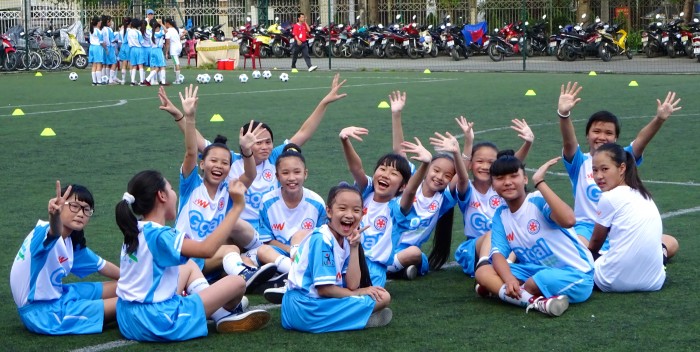How Business Can Change a Girl’s Trajectory

Picture by Standard Chartered
This week, member Standard Chartered is celebrating its 10-year anniversary of Goal, an initiative designed to equip girls with financial education and critical life skills for future success in their communities as leaders.
Launched in Delhi with 70 girls in 2006, Goal combines sports with life-skills training, such as health, finances, human rights, and leadership. Since its inception, Goal has reached 217,000 girls between the ages of 12-18, and aims to reach 600,000 girls through its comprehensive programming by 2018.
Over the course of its program, Goal has expanded its operations to more than 25 countries, including Gambia, India, Pakistan, China, Nigeria, and Jordan. It has also developed a starter toolkit for NGO partners on how to implement Goal for girls in their respective areas.
This 10th anniversary celebration is another way for Standard Chartered to communicate the progress of Goal both internally and externally through the telling of stories, as seen below:
”Our employees in”#Indonesia“volunteer to run”#Goal”for girls bc they believe in the girl effect.”#LeadershipGoal—
Goal Programme (@GoalGirlsGlobal) 26 Jul, 2016
Standard Chartered’s work to empower girls illustrates the ways in which business can facilitate girls’ learning and growth into leaders. Every $1 invested in girls’ preschool education yields $7 to $17 in future wages, and every additional year of secondary school education raises a girl’s future incomes by 15 to 25 percent. These investments not only enable girls to continue school and their education, but foster leadership skills critical for their future. With these skills in tow, girls’ life trajectory can forever change for the better. “I want to offer knowledge to people for free,” explained Goal participant Sanjeeta Biswa, “Everything I am now capable of, I would like to teach them.” Biswa’s empowerment is only one example of the benefits girls experience from investment in their leadership growth. “There is a place for everyone to invest along the [journey of a girl],” said Head, Global Community Programmes at Standard Chartered, Payal Dalal. GBC-Education’s Executive Chair Sarah Brown also shared her #LeadershipGoal for girls around the world this week:
”By empowering adolescent girls to be leaders, we can continue the fight to eradicate poverty”#LeadershipGoal — Sarah Brown (@SarahBrownUK)26 Jul, 2016
Business can play a pivotal role in this journey through a broad range of activities as they consider the type of impact they want to have on business and society. While Standard Chartered based this program on a direct programming model, there are a number of other ways that business can involve itself in girls’ education and leadership growth:
1. Direct Programming: Through direct engagement, business can help girls cultivate their leadership, academic, vocational, 21st-century skills, and professional development training
2. Educator Training: Business can enable quality education for girls by providing content knowledge and pedagogical approaches for educators, thereby enabling them to lead education programs to best encourage girls’ learning and individual growth
3. Product Development: Using its expertise and core assets, business can create and deliver physical goods and services that are usable and designed to improve learning for girls
4. Infrastructure: By securing and enhancing schools’ infrastructure, including the environment and technology necessary for accessing education, business can provide girls a safe space to thrive and learn
5. Policy Change: Business can advocate for policy change through support for advocacy and campaigning organizations or through their own communications, public affairs, public relations and marketing functions to ensure that every girl receives quality education worldwide
By employing its expertise, voice, and assets, business has an enormous opportunity to effect positive change for girls’ lives and leadership potential all around the world.
Join Standard Chartered this week to celebrate Goal’s 10th Anniversary by sharing your #LeadershipGoal for girls around the world and what #WomenEmpowerment means to you on Twitter.
See how the Liverpool Ladies FC is supporting Standard Chartered’s Goal initiative:
”Reds trio”@gembon23”&”@carolinebarker”to talk”@GoalGirlsGlobal — Liverpool Ladies FC (@LFCladies)28 Jul, 2016
To learn more about how business can support girls’ learning, education, and growth into leaders, see our page on the Girls’ Education Task Force, and contact us at [email protected].
